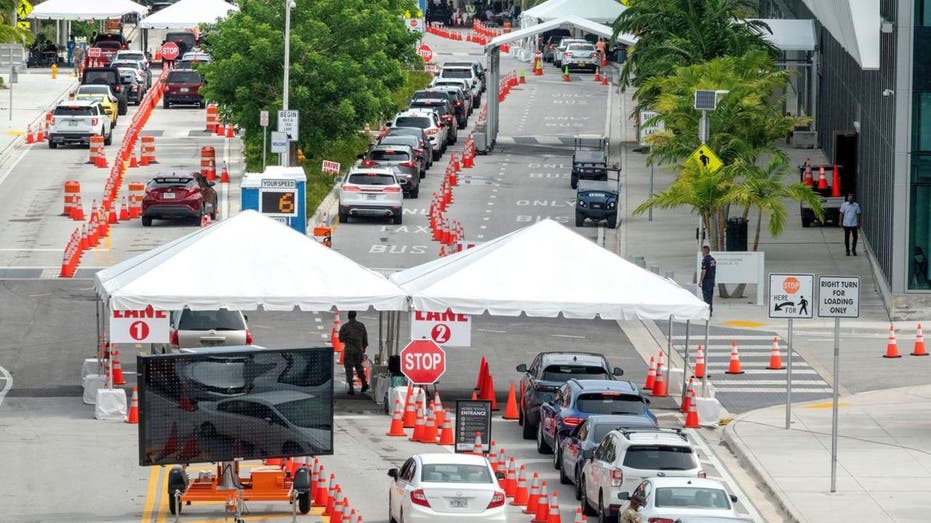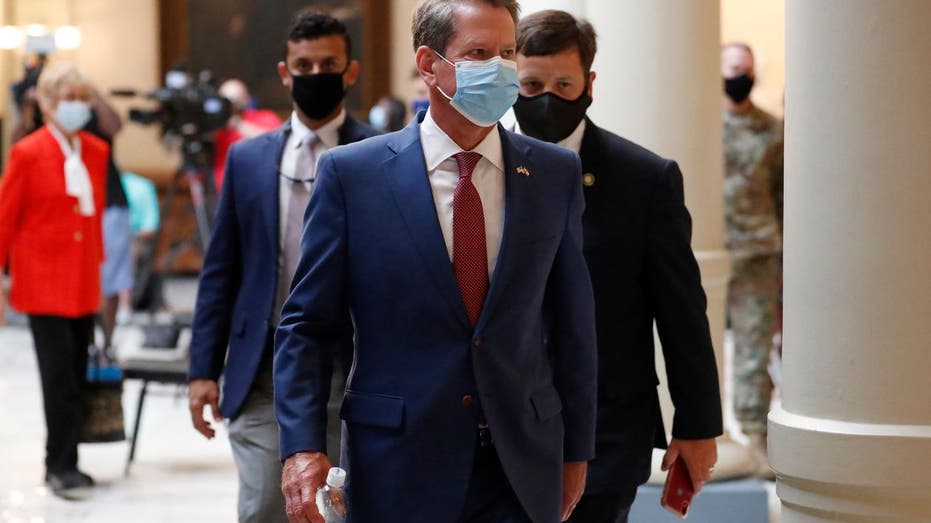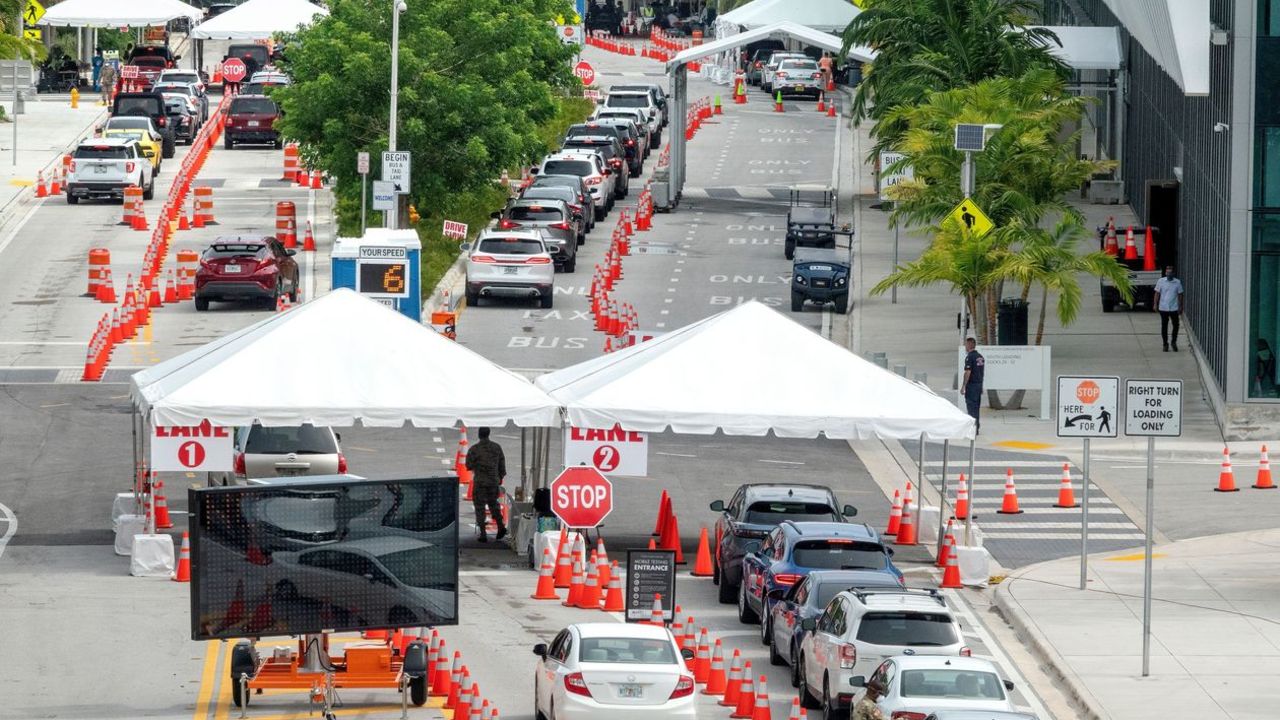US coronavirus cases hit daily record, officials target mask orders
U.S. death toll surpasses 138,900
Plans laid out by California and Texas suggest many children in each state will start the school year virtually, as coronavirus cases rose to another daily record and measures to slow the spread of the virus continued to meet political resistance.
Confirmed infections in the U.S. neared 3.6 million, as the country posted a single-day record of more than 77,000 new cases.
World-wide, a single-day record of 249,800 new infections was tallied Thursday, according to data compiled by Johns Hopkins University, exceeding the previous high of around 230,000 set a day earlier. Global deaths neared 600,000, and the U.S. death toll rose to more than 138,900.

Drivers waited to enter a coronavirus testing site Friday in Miami Beach, Fla. (CRISTOBAL HERRERA-ULASHKEVICH/SHUTTERSTOCK)
CARES ACT MORTAGE FORBEARANCE REPAYMENT OPTIONS
In California, where coronavirus cases have risen more than 20% over the past week, Gov. Gavin Newsom on Friday said schools could reopen for in-person classes only in counties that have been off the state’s Covid-19 watch list for two weeks. At least 32 of the state’s 58 counties, which account for the state’s most populous areas, are on the watch list. California, the most populous state in the nation, is home to more than 6 million school children.
Counties still on the watch list will resume distance learning, and districts will be required to provide devices and connectivity for every child. In schools that are opening their doors, staff members and any students in third grade or above are required to wear masks, while those in second grade or below are encouraged to wear them.
Recognizing that the virus is continuing to spread throughout California, the Democratic governor outlined criteria for closing reopened schools, starting with sending home individual classrooms. Schools will shut down if more than 5% of the campus tests positive. Districts will be closed if 25% of their schools are closed within a 14-day period.
DELTA WILL AVOID PILOT FURLOUGHS IF THEY AGREE TO REDUCED MINIMUM PAY: MEMO
State and local leaders across the country have pushed back school start dates and delayed returning to in-person learning, saying it’s too dangerous to have children in classrooms as the virus continues to rage across the U.S.
President Trump has demanded that school districts reopen or risk losing federal funding. His administration has tied the reopening of schools to economic recovery, saying keeping schools closed presents a challenge to working parents.
On Friday, the Texas Education Agency updated its guidance for reopening schools, saying districts could offer online learning for up to eight weeks in the fall. The announcement came after the agency said last week that daily in-person learning would be available for parents who want their children to attend.
Health officials in Dallas County on Thursday ordered schools there not to reopen for in-person instruction until after Labor Day. Houston Independent School District, the largest in the state, has already said it would delay opening and offer only online learning for the first six weeks.
Concerns over in-person learning from teachers and parents alike have grown as Texas has charted a sharp rise in new Covid-19 cases and subsequent hospitalizations. Friday’s guidance in the nation’s second most-populous state does allow students who don’t have access to the internet or devices to come in for in-person learning. But Republican Gov. Greg Abbott said Friday that the state would use $200 million in Cares Act funding to purchase e-learning devices and home internet solutions.

Georgia Gov. Brian Kemp, a Republican, filed a lawsuit against Atlanta’s Democratic mayor to block measures including a face-covering requirement. (JOHN BAZEMORE/ASSOCIATED PRESS)
CORONAVIRUS FORCES MLS TO DELAY DEBUTS OF 3 EXPANSION TEAMS
In some states, Democrats continued to meet resistance on preventive measures, including requiring residents to wear masks, which are seen by public-health experts as affordable and effective protection against the spread of the virus.
Kentucky’s supreme court on Friday issued stay orders allowing Democratic Gov. Andy Beshear’s coronavirus-related executive orders to remain in place for now after a state circuit judge said he would block them. As infections have risen in the state, Mr. Beshear has moved to limit the capacity of bars and restaurants and ordered Kentuckians to wear masks.
“If we want to argue in front of a court, let’s do it. I’m not afraid of courts, it’s what I used to do,” said Mr. Beshear, the state’s former attorney general. Republican Attorney General Daniel Cameron has helped lead the suit against Mr. Beshear’s orders.
Kentucky has moved gradually toward reopening since Mr. Beshear ordered most businesses to close and encouraged residents to stay at home in late March. With just over 21,000 cases in the state, Kentucky has fared better than some of its neighbors. Indiana has more than 50,000 confirmed cases, while Ohio and Tennessee each have more than 70,000.
In Georgia, Gov. Brian Kemp, a Republican, filed a lawsuit Thursday against Atlanta’s Democratic mayor and other officials to block some of their coronavirus-related restrictions—including a mask requirement—in the state’s biggest city.
Louisiana’s attorney general this week questioned the constitutionality of the governor’s order to wear masks. Gov. John Bel Edwards, a Democrat, has also faced opposition from GOP lawmakers who have pressed to end the state’s public-health emergency as a way to oppose Mr. Edwards’s decision to pause reopening plans.
GET FOX BUSINESS ON THE GO BY CLICKING HERE
GOP-led legislatures in Michigan and Pennsylvania also challenged gubernatorial power regarding emergency declarations aimed at curbing the pandemic. Courts in both states upheld the Democratic governors’ authorities.
In Arizona, Democratic mayors of four hard-hit cities called on Republican Gov. Doug Ducey to implement a statewide mask policy. The mayors of Phoenix, Tucson, Flagstaff and Tolleson signed a letter to the governor saying that the different rules around masks across the state are confusing and that people who don’t wear them are contributing to the virus’s spread.
“This patchwork approach in our fight against this crisis has proven to be ineffective,” they wrote.
Messrs. Ducey and Kemp have encouraged people to wear masks but stopped short of issuing statewide mandates, which Mr. Kemp has described as unenforceable. Mr. Trump, who for months resisted wearing a mask in public did so for the first time last weekend. He has declined to support a national mandate.
While there is widespread scientific and medical consensus that face masks are a key part of the public-policy response for tackling the pandemic, researchers say early disputes over masks’ efficacy have hampered their general adoption even as infections in the U.S. have soared. A Wall Street Journal/NBC News Poll found that nearly three-quarters of voters said they always wear a mask while shopping, working or when they’re around people outside their homes, an 11-percentage-point increase from last month. The share of Trump supporters who say they always wear masks climbed 15 points since June, from 39% to 54%.
The surge of coronavirus cases is complicating a budding economic rebound in the U.S. Federal data showed industrial production rose 5.4% in June from a month earlier, spurred by manufacturing-sector improvement—especially in motor vehicle output. But a jump in new Covid-19 cases is reviving pressure to reimpose restrictions, which could cut the recovery short. Industrial output in the second quarter, as a whole, was down 14.7% from the first quarter, the data showed.
In Argentina, President Alberto Fernandez on Friday extended the country’s quarantine measures through Aug. 2, but during that time restrictions will be gradually eased. If the health-care situation gets worse, stricter measures will resume, he said.
Brazil reported another 1,133 deaths on Friday, bringing its total to 77,851. Some Brazilian officials expect the pandemic to drag on for at least the rest of the year. São Paulo Mayor Bruno Covas said Friday the city will cancel its New Year’s Eve celebration on the Avenida Paulista, an event that brings more than a million people every year to the 1.7 mile-long main drag of Brazil’s most-populous city. Mr. Covas said he has been talking with São Paulo’s samba schools and with other cities about whether or not to allow Carnaval celebrations to take place in mid-February.




















